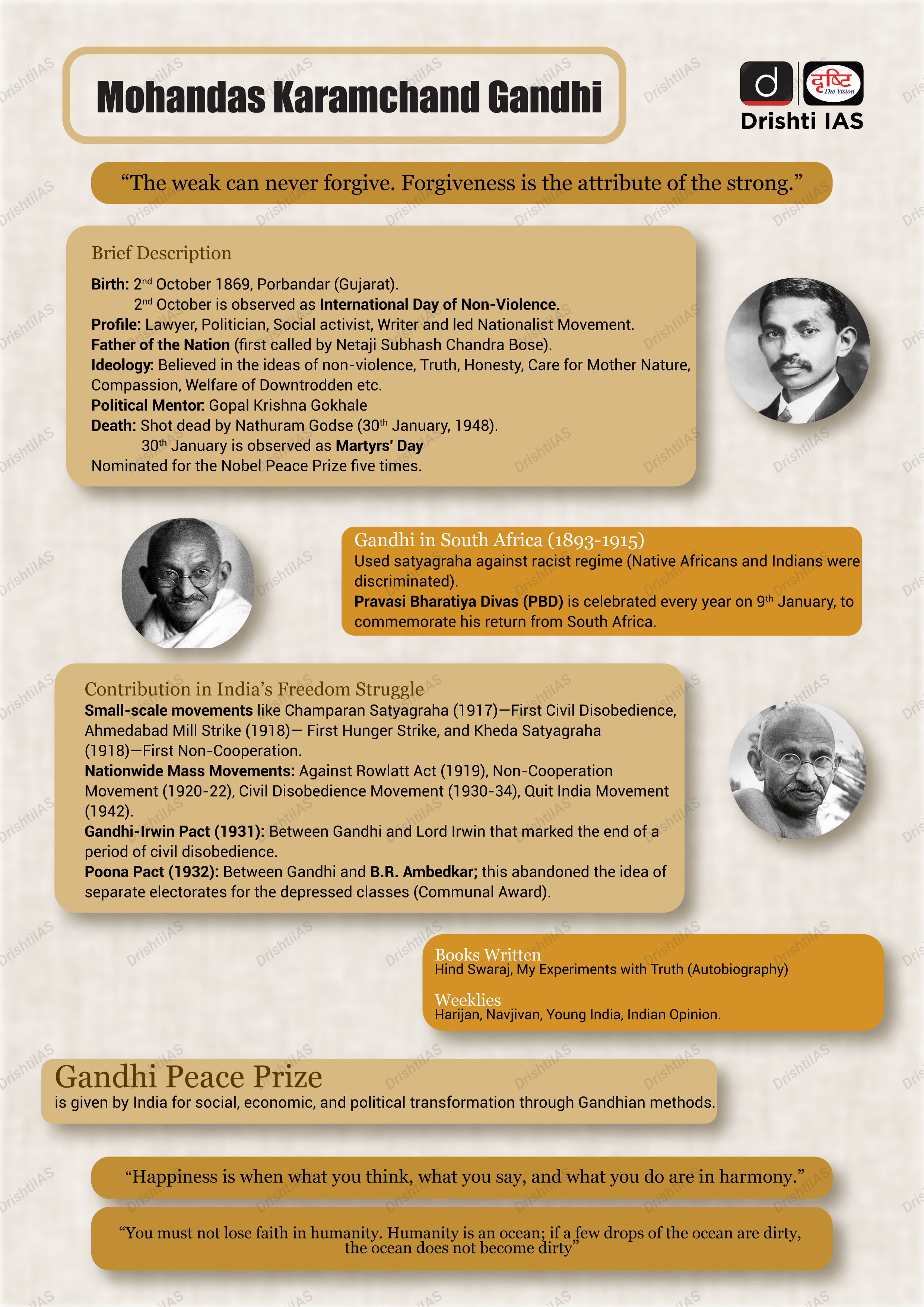Indian History
130th Year of Gandhiji’s Satyagraha
- 08 Jun 2023
- 6 min read
For Prelims: Indian Navy, India and South Africa, Nelson Mandela, Secularism.
For Mains: 130th Year of Gandhiji’s Satyagraha.
Why in News?
On 7th June 2023, the Indian Navy participated in a commemorative event to mark the 130th Anniversary of the start of the struggle against apartheid, started by Mahatma Gandhi (7th June 1893) at the Pietermaritzburg Railway Station near Durban, South Africa.
- INS Trishul, a frontline warship of the Indian Navy visited Durban to commemorate the event.
- This visit also commemorates the 30-year re-establishment of diplomatic relations between India and South Africa.
How was the Satyagraha Movement Started?
- On 7th June, 1893, Mahatma Gandhi faced racial discrimination when he was forced to leave a first-class compartment on a train in Pietermaritzburg, South Africa. Despite purchasing a ticket, a European passenger demanded his removal, citing that non-whites were not allowed in first-class compartments.
- This incident became a pivotal moment for Gandhi, sparking his fight against racial oppression and the development of his philosophy of Satyagraha (nonviolent resistance).
- In recognition of his contribution, Nelson Mandela, then President of South Africa, conferred the Freedom of Pietermaritzburg posthumously on Mahatma Gandhi in a moving ceremony at Pietermaritzburg Railway Station on April 25, 1997.
What were the Contributions of Gandhiji in South Africa?
- Legal and Social Activism:
- Gandhi arrived in South Africa in 1893 to handle a legal case but was inspired to fight for the rights of Indians in the country.
- He organized Indians in Durban and founded the Natal Indian Congress in 1894 to advocate for voting rights for Indians.
- He confronted discrimination and racism through his law practice, representing Indians and addressing their grievances.
- He mobilized support for the welfare of Indians and established the Transvaal British Indian Association in Johannesburg in 1903.
- Satyagraha and Passive Resistance:
- Gandhi launched his first Satyagraha (nonviolent resistance) campaign in Johannesburg in 1906 against an ordinance that imposed restrictions on Asians.
- He organized mass meetings and encouraged civil disobedience to challenge discriminatory laws.
- Gandhi faced imprisonment multiple times for his nonviolent protests, including the famous Volkrust Satyagraha in 1913.
- Establishment of Communal Living:
- Gandhi founded the Phoenix Settlement in Durban in 1904 as a community living experiment.
- He established the Tolstoy Farm near Johannesburg in 1910 to prepare Satyagrahis (followers of nonviolence).
- These initiatives aimed to foster self-reliance, promote communal harmony, and provide training in practical skills.
- Mobilization of Indian Community:
- Gandhi's activism and leadership inspired the Indian community to stand up against discriminatory laws and regulations.
- His methods of nonviolent resistance and civil disobedience had a significant impact on the South African Native National Congress, formed in 1912.
- Gandhi's political ideas and mobilization efforts played a role in shaping the formation and direction of the South African independence movement.
- Legal Reforms and Recognition of Indian Rights:
- Through his activism and negotiations, Gandhi compelled the South African government to pass the Indian Relief Act in 1914.
- This act abolished several discriminatory laws and recognized the rights of Indians in South Africa.
- Gandhi's efforts laid the groundwork for future reforms and set a precedent for nonviolent resistance in the struggle against oppression.
UPSC Civil Services Examination, Previous Year Question (PYQ)
Prelims
Q1. Who among the following is associated with ‘Songs from Prison’, a translation of ancient Indian religious lyrics in English? (2021)
(a) Bal Gangadhar Tilak
(b) Jawaharlal Nehru
(c) Mohandas Karamchand Gandhi
(d) Sarojini Naidu
Ans: (c)
Q2. With reference to the British colonial rule in India, consider the following statements: (2019)
- Mahatma Gandhi was instrumental in the abolition of the system of ‘indentured labour’.
- In Lord Chelmsford’s ‘War Conference’, Mahatma Gandhi did not support the resolution on recruiting Indians for World War.
- Consequent upon the breaking of Salt Law by Indian people, the Indian National Congress was declared illegal by the colonial rulers.
Which of the statements given above are correct?
(a) 1 and 2 only
(b) 1 and 3 only
(c) 2 and 3 only
(d) 1, 2 and 3
Ans: (b)
Mains
Q. Bring out the constructive programmes of Mahatma Gandhi during Non-Cooperation Movement and Civil Disobedience Movement. (2021)







